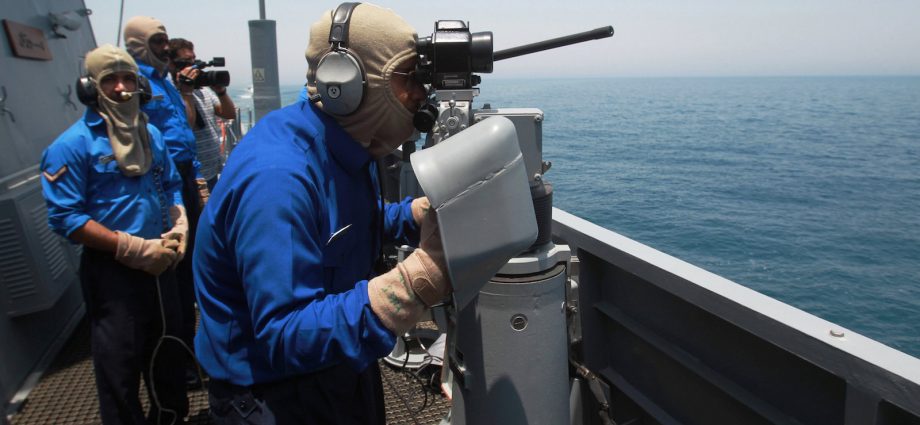
As US and Gulf Cooperation Council officials huddled in mid-February to discuss military coordination that could counter Iran’s destabilizing activity in the region, an explosive Iranian drone slammed into an Israeli-owned tanker in the Arabian Sea.
Though committed to GCC security and the freedom of navigation in the Persian Gulf – a waterway through which a quarter of global energy is shipped – the US has been unable to intercept Iranian attacks on international vessels or stop Tehran’s piracy.
The US has not responded punitively to years of Iranian aggression both at sea and across the Middle East or shown enough teeth to deter Tehran from committing these acts. Washington’s unwillingness to stop Iranian bullying of this kind raises awkward questions about what benefits Washington’s Gulf partners get out of their alliance with the US.
Along these lines, a joint US-GCC statement after the meeting last month seemingly downgraded America’s commitment to Gulf security. “Diplomacy remained the preferred way to address Iran’s destabilizing policies and nuclear escalation in a sustained manner,” the statement read.
Connecting Tehran’s destabilizing activities to diplomacy is unreasonable, if not outright impossible, given that Iran has refused to discuss with world powers any issues that are not about its nuclear program.
President Joe Biden has committed to reviving the 2015 Joint Comprehensive Plan of Action, which curbed Tehran’s nuclear program in exchange for sanctions relief. His predecessor Donald Trump withdrew the US from the agreement as part of a tougher approach to Iran.
Yet Biden’s team have failed to make headway with the talks, and Pentagon officials recently warned that Iran could now produce enough material for a nuclear bomb within just 12 days.
This makes Biden’s policy on Iran look even more toothless, not only because Washington insists on diplomacy, but because such diplomacy has no timetable or deadlines. Iran will agree to diplomacy whenever Iran agrees, or to put it in the words of Secretary of State Antony Blinken, the ball is in Iran’s court. And if Iran never agrees to talk, and continues to enrich uranium and threaten Gulf navigation, the US will just sit back and watch.
Washington, it turns out, still believes that an Iranian “change in behavior” is possible, a policy reminiscent of the days of former president Barack Obama. “Iran’s leadership could choose a better alternative that would contribute to a more secure and stable region and benefit the Iranian people,” said the US-GCC statement.
Betting on “behavior change” is based on the assumption that once Iran is reconnected to the global economy, its officials will have a vested interest in abandoning their policies to keep money flowing to their coffers. Such a policy was tested between 2016 and 2018. It failed miserably.
Other than the endless rounds of talks with Iran in Vienna or other European capitals, the Biden team seems to be out of ideas on how to defend America’s allies among the Gulf monarchies. The Iranian regime often tells its Gulf neighbors that the US will never come to their rescue and that the only guarantee for their security is to bend to Tehran’s wishes. The Biden administration seems OK with such an arrangement.
But Washington has been trying to impress on GCC countries that their alliance with the US is worthwhile. In its most recent National Security Strategy, the Biden administration said that instead of military force, it will “strengthen partner capacity” by “enabling regional security integration” and “enabling our partners to defend their territory.”
Enabling partners’ defenses requires, in the very least, guaranteeing them a steady flow of arms, something that America’s Democrats have been using as a political tool.
If the US wants to build the defense capabilities of its allies, arms supply should never be up for bargaining, especially given that America is not giving these weapons out for free but for colossal amounts of money. If Washington is not willing to sell defense to these countries, then Gulf monarchies might want to fetch defense contractors elsewhere.
Policy disagreements between allies are normal. What is not normal, however, is Washington’s unpredictable swings in its relations with Gulf countries.
There are days when America’s relations are incumbent on principles, especially human rights. Then there are other days when the US forgets about human rights and demands that GCC members export as much oil as they can. In both cases, the US quickly escalates to threats of ending arms sales.
Whatever its Gulf policy, the Biden administration’s approach should be coherent. Since he took office that has simply not been the case.
Many Americans wish to see democracy spread to every corner of Earth. Yet experience has shown that military power alone cannot force democracy on regimes such as those in the Gulf region that are not ready for it. Experience has also shown that America today lacks the endurance required to build democratic nations, as it did in Germany and Japan after World War II.
The less the US is willing to get involved in global affairs, the more realistic it has to become when dealing with the world. Washington must deal with countries – friends or foes – as they are, not as the US likes them to be.
When American foreign policy becomes more predictable, GCC allies will know where to stand and what to expect, unlike the rollercoaster relationship that they have been having with Washington of late.
This article was provided by Syndication Bureau, which holds copyright.

